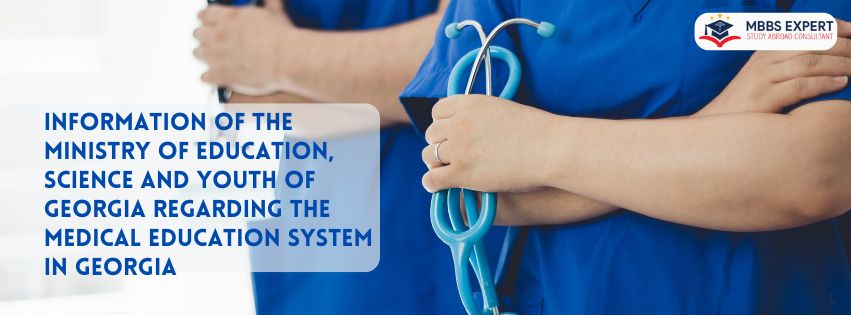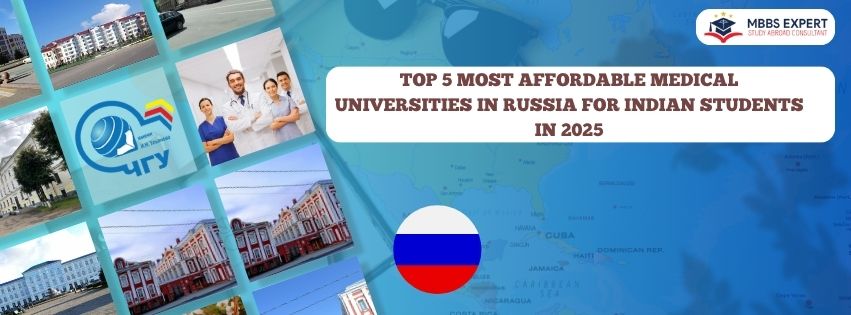Budget-Friendly Medical Education in Russia: Affordable Universities for Indian Students Introduction Pursuing a medical degree…

Information of the Ministry of Education, Science and Youth of Georgia regarding the medical education system in Georgia
![]()
The Ministry of Education, Science, and Youth of Georgia provides crucial information regarding the structure and accreditation of medical education in the country. The medical programs (MD) offered by universities and medical schools in Georgia are accredited and authorized by the National Center for Educational Quality Enhancement (NCEQE). This accreditation is recognized on an international scale by the World Federation of Medical Education (WFME), ensuring that the medical degrees earned in Georgia are acknowledged worldwide. As a result, the number of international students pursuing medical education in Georgia continues to rise.
The international recognition of these medical degrees is a testament to Georgia’s high standards in medical education. Graduates with an MD degree from Georgia are equipped with the qualifications necessary to practice medicine in many countries, without needing to seek additional certification in most cases. This makes Georgia an attractive destination for students from various countries, especially those seeking a global medical career.
Accreditation and International Recognition of Medical Programs
The accreditation of medical programs in Georgia by the National Center for Educational Quality Enhancement (NCEQE) is pivotal. The NCEQE ensures that medical education programs meet rigorous standards that are in line with international medical education criteria. Its recognition by the WFME further cements the credibility of Georgian medical programs. WFME is a global leader in setting benchmarks for medical education, and its endorsement means that Georgian MD degrees are accepted in many countries, including the United States, the United Kingdom, India, and others.
This international recognition is one of the primary reasons for the growing influx of international students into Georgia’s medical schools. Students can be assured that their MD degrees from Georgian universities will be acknowledged globally, allowing them to pursue medical careers in multiple countries without facing significant barriers in credential recognition.
Structure and Duration of Medical Programs in Georgia
Medical education in Georgia follows a structure aligned with international standards. The duration of an MD program is six years, which is equivalent to 360 ECTS (European Credit Transfer and Accumulation System) credits. The MD degree in Georgia is comparable to the MBBS qualification offered in countries like India and the UK. The program includes a combination of theoretical coursework, practical training, and clinical experience. The final year of the six-year program is dedicated to an internship, providing students with hands-on experience in a clinical setting.
The six-year program is meticulously designed to meet both national regulations and medical sector benchmarks. To gain accreditation from the NCEQE, medical programs must comply with these standards. This ensures that graduates from Georgian medical schools are not only well-prepared but also qualified to practice medicine in various international jurisdictions.
Junior Doctor Role and Employment Opportunities
Upon graduation, students with an MD degree in Georgia are entitled to practice medicine as junior doctors. This right is granted under the Law of Georgia on Medical Practice. Graduates can immediately seek employment as junior doctors without having to pass any additional exams, provided they have graduated from an accredited medical institution.
A junior doctor in Georgia performs the duties of a medical professional under the supervision of a certified doctor. This role is critical in the medical system as it allows new graduates to gain valuable experience while working alongside experienced physicians. Moreover, in situations where a certified doctor is unavailable, junior doctors are authorized to provide emergency medical care independently.
This framework ensures that medical graduates in Georgia can transition smoothly from education to practical experience. The junior doctor role also aligns closely with the MBBS qualification in India, as junior doctors in both countries perform similar duties under supervision and are allowed to practice independently in certain situations.
Compliance with National Medical Commission (NMC) Regulations
Medical education in Georgia is fully compliant with the new regulations of the National Medical Commission (NMC). This compliance is vital for Indian students who wish to practice medicine in India after completing their education in Georgia. The NMC sets standards for medical education for Indian students studying abroad, and Georgia’s medical education system meets these criteria, ensuring that students can return to India and pursue their medical careers without any additional hurdles.
The alignment of Georgian medical programs with NMC guidelines further enhances Georgia’s reputation as a favorable destination for medical students. Indian students can be confident that their education in Georgia will equip them with the skills and qualifications necessary to practice medicine in India or pursue further specialization.
Advantages of Studying Medicine in Georgia
There are several compelling reasons why Georgia has become a popular destination for medical students worldwide. The primary advantages include:
- Global Recognition of Degrees: Georgian MD programs are internationally recognized, allowing graduates to practice medicine in numerous countries without the need for additional certifications. This recognition is a significant draw for students who wish to have a flexible, global medical career.
- High Educational Standards: The medical education system in Georgia is held to rigorous standards, thanks to the oversight of the National Center for Educational Quality Enhancement. This ensures that students receive high-quality training and education that prepares them for the demands of the medical profession.
- Affordable Tuition Fees: Compared to medical education in countries like the United States and the United Kingdom, studying medicine in Georgia is more affordable. This makes it an attractive option for students seeking high-quality education without the burden of excessive student loans.
- Diverse Student Community: Georgia has become a hub for international students, particularly those pursuing medical degrees. The growing number of foreign students creates a vibrant and diverse academic community, providing students with the opportunity to interact with peers from different cultural backgrounds.
- English-Medium Instruction: Most medical programs in Georgia are offered in English, making them accessible to international students who may not speak Georgian. This removes language barriers and ensures that students can focus on their studies without the additional challenge of learning a new language.
- Modern Infrastructure and Facilities: Georgian medical universities are equipped with state-of-the-art facilities, modern laboratories, and advanced medical equipment. This ensures that students receive hands-on training using the latest technology, preparing them for the challenges of modern medicine.
- Pathway to Postgraduate Studies: Georgian medical graduates have access to various postgraduate opportunities in countries like the US, the UK, and other European nations. The international recognition of Georgian degrees simplifies the process of applying for further specialization programs abroad.
Conclusion
In summary, Georgia’s medical education system offers a comprehensive, internationally recognized program that prepares students for successful medical careers. Accredited by the National Center for Educational Quality Enhancement and recognized by the World Federation of Medical Education, Georgia’s medical degrees are accepted globally. The six-year MD program, equivalent to the MBBS degree in countries like India and the UK, provides students with a solid foundation in medicine and hands-on clinical experience during their final year.
The role of the junior doctor allows graduates to begin their medical careers immediately after graduation without the need for additional exams, providing them with practical experience under the supervision of certified doctors. Furthermore, compliance with NMC regulations ensures that Indian students studying in Georgia can return to India and practice medicine seamlessly.
With its high educational standards, affordability, and global recognition, Georgia continues to attract a growing number of international students seeking a world-class medical education.





